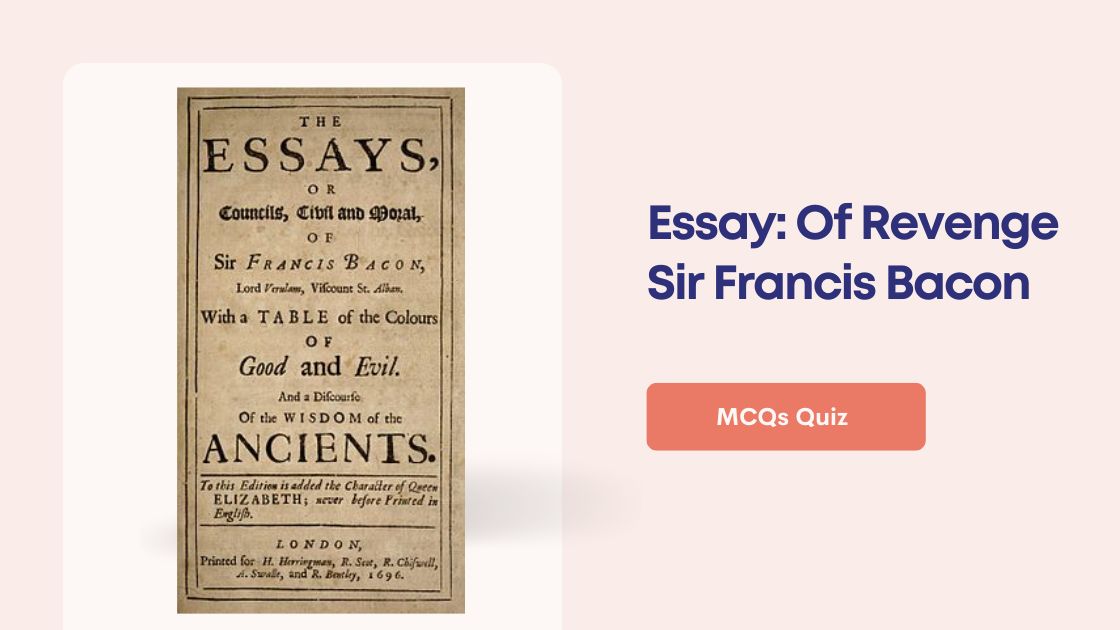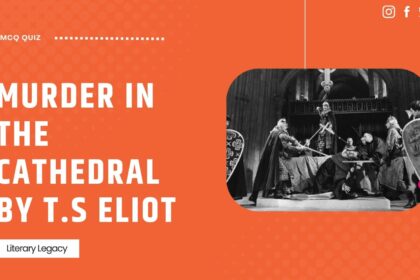1. According to Francis Bacon, revenge is referred to as …………………………………. behavior.
A. Animalistic
B. Rational
C. Justifiable
D. Civilized
Answer: Animalistic (A)
Bacon starts the essay by calling revenge as animalistic behavior by using the words ‘wild justice’ for it.
2. Bacon suggests that taking revenge means a person is …………………………………. the law.
A. Enforcing
B. Violating
C. Respecting
D. Upholding
Answer: Violating (B)
If one commits a crime or does some harm to anybody, he/she is offending and violating the law.
3. What does Bacon imply about the effectiveness of the law when a person takes revenge?
A. The law strengthens its power
B. The law becomes more respected
C. The law loses its significance
D. The law is redefined
Answer: The law loses its significance (C)
The law is useless when a person tries to take revenge himself.
4. According to Bacon, what quality does forgiving others reflect?
A. Cunning
B. Superiority
C. Cowardice
D. Weakness
Answer: Superiority (B)
By ignoring or forgiving the wrong done to one by other makes a person superior to others.
5. Bacon suggests that wise men don’t dwell in the …………………………………..
A. Future
B. Past
C. Imagination
D. Present
Answer: Past (B)
To him, wise men don’t think about the past. For what is done, is gone that cannot be changed.
6. In Bacon’s essay, what is the significance of forbearing others?
A. It leads to respectability
B. It leads to revenge
C. It leads to corruption
D. It leads to chaos
Answer: It leads to respectability (A)
By forbearing others, one makes a respectable place in society.
7. What does Bacon imply about the wrongdoer and the counter-attacker when it comes to revenge?
A. The wrongdoer is always right
B. The counter-attacker is superior
C. They are justified in their actions
D. They are equally at fault
Answer: They are equally at fault (D)
Undoubtedly by taking revenge, the wrongdoer and the counter-attacker are equal and at the same level.
8. ‘Revenge is totally against the law.’ This statement means that revenge is …………………………………..
A. ‘Civilized justice’
B. ‘Legal justice’
C. ‘Wild justice’
D. ‘Divine justice’
Answer: ‘Wild justice’ (C)
‘Revenge is totally against the law.’ By ignoring or forgiving the wrong done to one by other makes a person superior to other.
9. ‘The more one’s nature turns toward taking revenge, the more he is taking the law into his hands.’ What does this imply according to Bacon?
A. ‘An eye for an eye’ destroys society
B. ‘An eye for an eye’ undermines legal systems
C. ‘An eye for an eye’ is justifiable
D. Revenge is noble
Answer: ‘An eye for an eye’ undermines legal systems (B)
‘By such contrast, he describes the whole picture of the animal and human life.’
10. Why do people usually do wrong to others?
A. For the sake of wrong
B. To seek forgiveness
C. Out of love for the other person
D. To gain profit or pleasure
Answer: To gain profit or pleasure (D)
The text mentions that people do wrong to gain profit, pleasure, respect, honor, or other benefits.
11. Why does Bacon suggest not becoming mad at a person who loves themselves more?
A. To show compassion
B. Out of respect
C. It is not beneficial
D. Because it causes harm to the other person
Answer: It is not beneficial (C)
Bacon argues that getting mad at someone who loves themselves more is not productive or beneficial.
12. What is referred to as ‘wild justice’?
A. Public revenge
B. Private revenge
C. Forgiving friends
D. Taking revenge silently
Answer: Private revenge (B)
‘Wild justice’ is used by Bacon to describe private revenge as opposed to public revenge.
13. What lesson does Bacon believe public acts of revenge provide?
A. A guide for other individuals
B. The importance of forgiveness
C. How to take revenge silently
D. The necessity of private revenge
Answer: A guide for other individuals (A)
Bacon mentions that public acts of revenge serve as an example and a lesson for others.
14. Why does Bacon advise against focusing too much on taking revenge?
A. To heal and move forward
B. To seek approval from others
C. Because it makes a person happy
D. To keep wounds open
Answer: To heal and move forward (A)
Bacon suggests that focusing on revenge prevents healing and moving forward in life.
15. What does Bacon compare ‘vengeful friends’ to in the text?
A. Cosmos and Duke of Florence
B. Witches
C. Snakes
D. Thorn and briar
Answer: Snakes (C)
‘Vengeful friends’ are compared to snakes who stab at your back in the text.
16. Why does Bacon mention that it is more delightful to make one repent than to hurt?
A. To prove one’s superiority
B. To show compassion
C. To seek forgiveness
D. To enjoy the suffering of others
Answer: To prove one’s superiority (A)
‘It is more delightful to make one repent than to hurt’ is mentioned by Bacon as a way of showing superiority over others.
17. How does Bacon describe people who do wrong because it is their nature?
A. ‘Thorn’ and ‘briar’
B. ‘Sadists’
C. ‘Witches’
D. ‘Cowards’
Answer: ‘Thorn’ and ‘briar’ (A)
‘People who do wrong because it is their nature’ are described as ‘thorn’ and ‘briar’ (bushes) in the text.
18. What argument does Bacon present against the act of avenging a wrong?
A. Private revenge is more beneficial.
B. To forgive is a weakness.
C. A person should always seek revenge.
D. To avenge is a distortion of the law.
Answer: To avenge is a distortion of the law. (D)
Bacon argues that avenging a wrong is a distortion of the law.
19. Why does Bacon argue against taking revenge?
A. To prove one’s courage
B. To seek profit or pleasure
C. To show dominance over others
D. To set an example for society
Answer: To set an example for society (D)
Bacon argues against taking revenge to set an example for society and to discourage private acts of revenge.
20. What does Bacon suggest in terms of forgiving friends who do wrong?
A. Forgive them unconditionally
B. Seek revenge against them
C. Ignore their actions
D. Consider them as evil from God
Answer: Consider them as evil from God (D)
Bacon suggests that friends who do wrong should be considered as evil from God and should not be avenged.
21. According to Bacon, why is private revenge considered unfortunate?
A. It is lawful and justifiable
B. It brings no benefit to the avenger
C. It helps maintain order in society
D. It leads to a life of witches
Answer: It leads to a life of witches (D)
Private revenge is considered unfortunate by Bacon because it leads to a life of witches and the wounds never heal.
22. What does Bacon compare those seeking revenge to?
A. Law-abiding citizens
B. Wise men
C. Public figures setting examples
D. Animals living in the wild
Answer: Animals living in the wild (D)
Bacon compares those seeking revenge to animals living in the wild to highlight the animalistic nature of seeking revenge.
23. Why does Bacon suggest forgiving and moving on from past wrongs?
A. To concentrate on present and future
B. To seek profit or honor
C. To dominate over those who wronged you
D. To set an example for others
Answer: To concentrate on present and future (A)
Bacon suggests forgiving and moving on from past wrongs to concentrate on the present and future as dwelling on the past is useless.
24. Why does Bacon mention that public acts of revenge are fortunate?
A. To set examples for society
B. To promote hatred among individuals
C. To show dominance over enemies
D. To encourage private acts of revenge
Answer: To set examples for society (A)
Bacon mentions that public acts of revenge are fortunate as they set examples for society and deter others from wrongdoing.
25. How does Bacon view the concept of ‘wild justice’?
A. As a divine intervention
B. As a symbol of animalistic behavior
C. As a lawful form of justice
D. As a moral obligation
Answer: As a symbol of animalistic behavior (B)
Bacon views ‘wild justice’ as a symbol of animalistic behavior, contrasting it with human societal laws.
26. What does Bacon argue about forgiving enemies and friends?
A. Friends should always be forgiven, enemies should be avenged.
B. Both friends and enemies should be forgiven.
C. Both friends and enemies should always be avenged.
D. Enemies should always be forgiven, friends should be avenged.
Answer: Enemies should always be forgiven, friends should be avenged. (D)
Bacon argues that enemies should be forgiven but friends who do wrong should not be forgiven.
27. What does Bacon believe regarding the idea of taking the law into one’s own hands?
A. It is acceptable in certain cases.
B. It renders the law useless.
C. It is a necessary part of ethical supremacy.
D. It is always justified in seeking revenge.
Answer: It renders the law useless. (B)
Bacon believes that taking the law into one’s own hands renders the law useless, especially in cases of private revenge.
28. According to Bacon, why is it unwise to dwell on past wrongs?
A. Because it leads to a life of witches.
B. Because others may take advantage of your situation.
C. Because past wrongs can never be avenged.
D. Because it suggests a lack of ethical supremacy.
Answer: Because it suggests a lack of ethical supremacy. (D)
Bacon argues that dwelling on past wrongs is unwise as it suggests a lack of ethical supremacy and wisdom.



